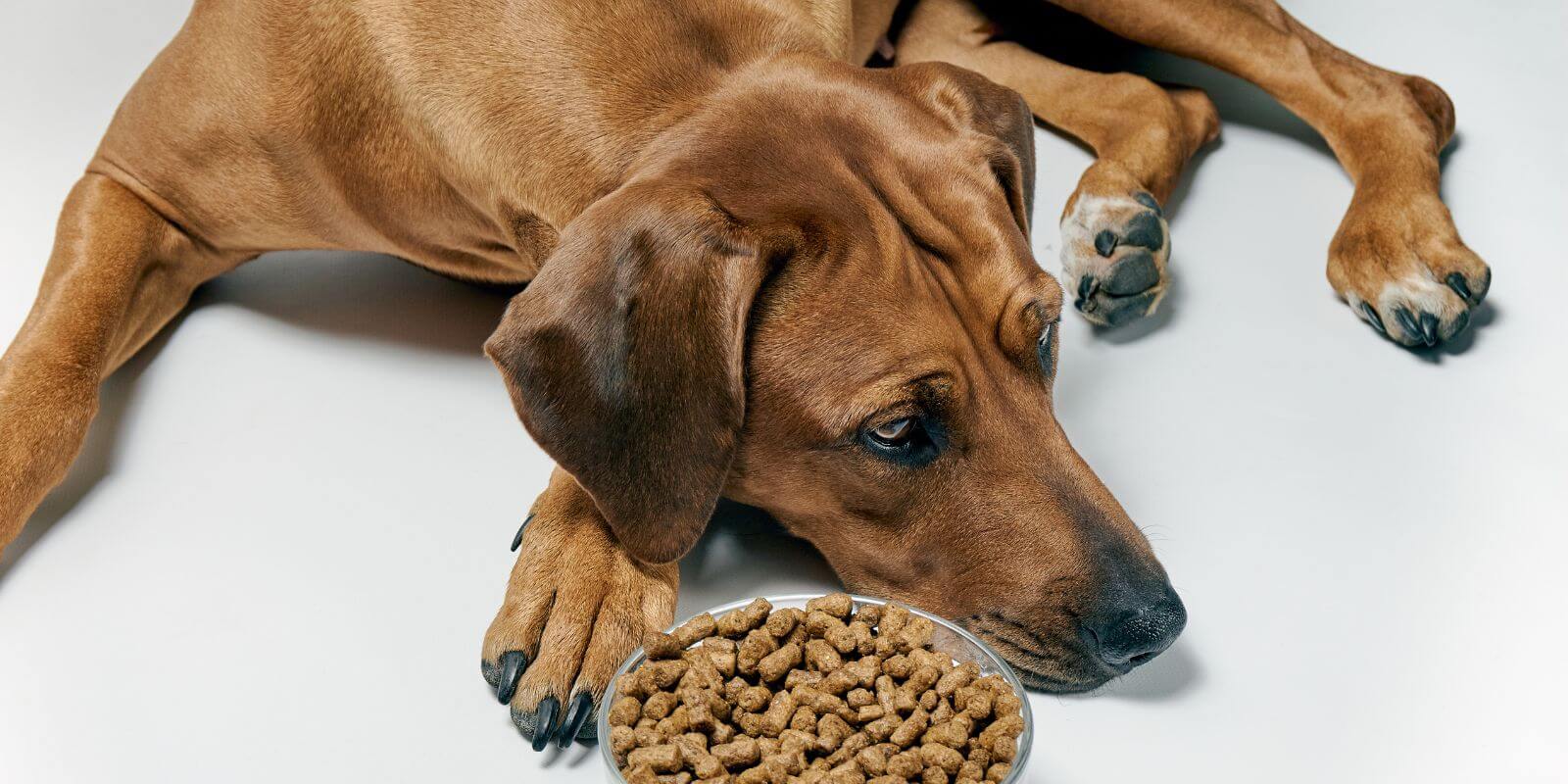Considering that almost 40% of dogs are overweight, often by being totally food driven, it might seem unusual that dogs won’t eat. Although this is not nearly as common as being overweight, it can also be a problem for pet parents. There are numerous reasons why, so let’s explore what could be the problem.
Is Your Dog a Puppy?
The first consideration is the age of your dog. When a new puppy comes home, especially from a large litter where they have had to compete with their siblings for every meal being offered (including the time before they were weaned), it is expected that they will inhale the puppy food. Initially, this is often just plain kibble, which isn’t that appealing to us, but most hungry pups gobble it up within seconds. As they get older, say 6-8 months, many pups become far less enthusiastic and will often leave the dry kibble and come back to it as the hunger pains take over. As long as the proper daily portions are eventually being consumed, there really is no problem with this. However, as owners, we may feel guilty if we aren’t witnessing an enthusiastic pup eating up their meal. In situations like this, there are two solutions that may well help.
Tip to help your puppy eat
The first is to add warm water to the kibble and let it sit for a minute before offering it. The heat releases the fatty smells in the food and, as we know from personal experience, if food smells better, it tastes better. This solution can be a permanent solution, but if it is not, then one can take a small amount of canned food, say a tablespoon or two for a 50 lb dog, and mix it into the kibble with the warm water. This usually works for most dogs well through adulthood.
Environmental Changes
Some dogs can be quite sensitive to their environments and a change in their surroundings can certainly affect their appetite. Moving from one home to another is quite often a problem for cats, but even some dogs can find it difficult to adjust and may go off their food for a few days or even a couple of weeks. A key family member can head off to university, which can affect the family dog.
Deterioration in the Quality of the Dog Food
Less common reasons for a loss of appetite could include the food itself. A bag of kibble might have gone “off” due to how it was stored or it has become stale (best before dates are stamped on the bag). If you can see either mold growing or it doesn’t smell right, dispose of it and start with a fresh bag. If your dog is being treated for another medical condition, there are numerous medications that can suppress the appetite, especially chemotherapeutic drugs, but usually, your veterinarian will warn you to watch out for such side effects.
Tips On Getting Your Dog To Eat Again
Some dogs are simply picky eaters. All dog food, whether canned or dry, contains fat for a variety of reasons, but largely because it makes the food smell and taste better. The best way to release these fats is either warming up canned food in a microwave (obviously, not while still in the can!) or adding warm/hot water to kibble.
Switching dog food
If this is not a sufficient incentive, then one can consider switching foods altogether, either to a new canned food or a new kibble. This gradual transition from the old food to the new should be done over about a week, to avoid any risk of digestive upset. A number of pet food manufacturers offer dental diets, which really do work, in terms of helping to keep the teeth clean. However, because these diets are often sprayed with a chicken digest when they are produced, they often taste better than many other kibble diets. Trying a dental diet may solve the picky appetite all on its own.
Refrain from offering human food
If an owner were to offer human food, either in response to begging at the table or as table scraps scraped into a feeding dish, there is a significant risk that a dog will decide that human food, and only human food, is the way forward. This creates a very challenging problem and is not recommended. Dogs are not only at greater risk of digestive upsets (vomiting, diarrhea and pancreatic disease) from eating human food (especially fatty foods), they likely won’t want to go back to eating their own food.
Medications from your vet
If your dog is receiving long-term therapeutic drugs (e.g. chemotherapy) for which there is a common side effect of decreased appetite, your veterinarian can offer additional drugs that act as an appetite stimulant to counteract the negative effects of the original treatment.
If you believe your pet may be in pain, either due to some post-operative procedure or some medical condition under treatment, this can certainly decrease their appetite. Again, there are numerous veterinary products that your veterinarian can dispense to deal with any discomfort.
At What Point Should I Seek Medical Attention If My Dog Won’t Eat
There are different degrees of not wanting to eat. A dog that still eats, but in lesser amounts and with less enthusiasm would be referred to as being inappetent. A dog who won’t eat anything would be called anorexic. It is important to consider your dog’s overall demeanour and activity when deciding if the decreased appetite should be concerning. It is equally important to assess whether there are any other clinical signs that are occurring in addition to the loss of appetite.
If you have a geriatric dog that has been happily eating the same food its entire life and suddenly stops eating, the answer is not likely a minor issue. Dogs can become bored with a type of food, as with the puppy example above, but with a vintage dog, there is likely another reason and the first thing to consider is a medical problem. If the loss of appetite is quite abrupt and your dog is having difficulty eating, with no other signs, then there may well be a problem with the teeth, like an abscessed tooth.
If the loss of appetite is more gradual, over several days or even weeks, that could be even more serious. Usually, there are more clinical signs present, such as drinking more water, listlessness, diarrhea, or vomiting. If any of these clinical signs accompany your dog not eating, either abruptly or gradually, especially if it is older, a trip to your veterinarian as soon as possible is indicated. Because a loss of appetite is such a non-specific sign, the successful treatment of the underlying condition is very often linked to how quickly it is diagnosed. A dog who appears playful, bright and active, yet has a poor appetite is not likely an urgent medical concern. However, a dog who is dull, and listless with concomitant clinical signs need to be examined as soon as possible.



